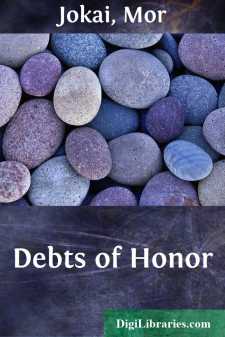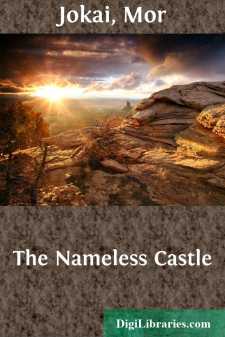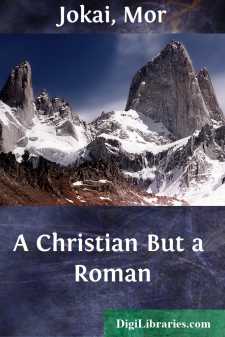Categories
- Antiques & Collectibles 13
- Architecture 36
- Art 48
- Bibles 22
- Biography & Autobiography 813
- Body, Mind & Spirit 142
- Business & Economics 28
- Children's Books 16
- Children's Fiction 13
- Computers 4
- Cooking 94
- Crafts & Hobbies 4
- Drama 346
- Education 46
- Family & Relationships 57
- Fiction 11829
- Games 19
- Gardening 17
- Health & Fitness 34
- History 1377
- House & Home 1
- Humor 147
- Juvenile Fiction 1873
- Juvenile Nonfiction 202
- Language Arts & Disciplines 88
- Law 16
- Literary Collections 686
- Literary Criticism 179
- Mathematics 13
- Medical 41
- Music 40
- Nature 179
- Non-Classifiable 1768
- Performing Arts 7
- Periodicals 1453
- Philosophy 64
- Photography 2
- Poetry 896
- Political Science 203
- Psychology 42
- Reference 154
- Religion 513
- Science 126
- Self-Help 84
- Social Science 81
- Sports & Recreation 34
- Study Aids 3
- Technology & Engineering 59
- Transportation 23
- Travel 463
- True Crime 29
Debts of Honor
by: Mor Jokai
Description:
Excerpt
CHAPTER I
THE JOURNAL OF DESIDERIUS
At that time I was but ten years old, my brother Lorand sixteen; our dear mother was still young, and father, I well remember, no more than thirty-six. Our grandmother, on my father's side, was also of our party, and at that time was some sixty years of age; she had lovely thick hair, of the pure whiteness of snow. In my childhood I had often thought how dearly the angels must love those who keep their hair so beautiful and white; and used to have the childish belief that one's hair grows white from abundance of joy.
It is true, we never had any sorrow; it seemed as if our whole family had contracted some secret bond of unity, whereby each member thereof bound himself to cause as much joy and as little sorrow as possible to the others.
I never heard any quarrelling in our family. I never saw a passionate face, never an anger that lasted till the morrow, never a look at all reproachful. My mother, grandmother, father, my brother and I, lived like those who understand each other's thoughts, and only strive to excel one another in the expression of their love.
To confess the truth, I loved none of our family so much as I did my brother. Nevertheless I should have been thrown into some little doubt, if some one had asked me which of them I should choose, if I must part from three of the four and keep only one for myself. But could we only have remained together, without death to separate us or disturb our sweet contentment, until ineffable eternity, in such a case I had chosen for my constant companion only my brother. He was so good to me. For he was terribly strong. I thought there could not be a stronger fellow in the whole town. His school-fellows feared his fists, and never dared to cross his path; yet he did not look so powerful; he was rather slender, with a tender girl-like countenance.
Even now I can hardly stop speaking of him.
As I was saying, our family was very happy. We never suffered from want, living in a fine house with every comfort. Even the very servants had plenty. Torn clothes were always replaced by new ones and as to friends—why the jolly crowds that would make the house fairly ring with merry-making on name-days and on similar festive occasions proved that there was no lack of them. That every one had a feeling of high esteem for us I could tell by the respectful greetings addressed to us from every direction.
In Hungary persons celebrate the name-day of the saint after whom they are called with perhaps more ceremony than their birthday.
My father was a very serious man; quiet and not talkative. He had a pale face, a long black beard, and thick eyebrows. Sometimes he contracted his eyebrows, and then we might have been afraid of him; but his idea always was, that nobody should fear him; not more than once a year did it happen that he cast an angry look at some one. However, I never saw him in a good humor. On the occasion of our most festive banquets, when our guests were bursting into peals of laughter at sprightly jests, he would sit there at the end of the table as one who heard naught. If dear mother leaned affectionately on his shoulder, or Lorand kissed his face, or if I nestled to his breast and plied him, in child-guise, with queries on unanswerable topics, at such a time his beautiful, melancholy eyes would beam with such inexpressible love, such enchanting sweetness would well out from them! But a smile came there never at any time, nor did any one cause him to laugh.
He was not one of those men who, when wine or good humor unloosens their tongue, become loquacious, and tell all that lies hidden in their heart, speak of the past and future, chatter and boast. No, he never used gratuitous words. There was some one else in our family just as serious, our grandmother; she was just as taciturn, just as careful about contracting her thick eyebrows, which were already white at that time; just as careful about uttering words of anger; just as incapable of laughing or even smiling. I often remarked that her eyes were fixed unremittingly on his face; and sometimes I found myself possessed of the childish idea that my father was always so grave in his behavior because he knew that his mother was gazing at him. If afterward their eyes met by chance, it seemed as if they had discovered each other's thoughts—some old, long-buried thoughts, of which they were the guardians; and I often saw how my old grandmother would rise from her everlasting knitting, and come to father as he sat among us thus abstracted, scarce remarking that mother, Lorand, and I were beside him, caressing and pestering him; she would kiss his forehead, and his countenance would seem to change in a moment: he would become more affectionate, and begin to converse with us; thereupon grandmother would kiss him afresh and return to her knitting....












